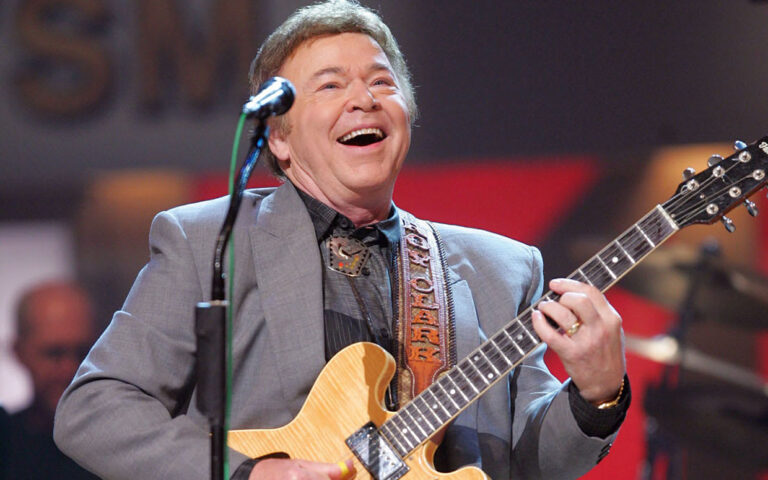Early Life & Background
Roy Linwood Clark was born on April 15, 1933, in Meherrin, Virginia, into a family where music was a part of everyday life. His father, Hester Clark, played guitar, banjo, and fiddle, and it was through him that Roy developed his first love for music. From a very early age, Roy was captivated by the sound of instruments and taught himself to play them. By the time he was a teenager, he had become skilled on the guitar, banjo, and mandolin, showing signs of the virtuosity that would later make him a star.
The family eventually moved to Washington, D.C., where Roy was exposed to a wider range of musical styles. He was equally inspired by the country greats such as Hank Williams and the swing and jazz music that dominated the era. Although academics were never his strongest pursuit, music gave him a sense of purpose. At just fifteen, he was already performing on stage, and soon after, he won two national banjo championships, firmly establishing himself as a young talent to watch.
Career Journey & Major Achievements
In the 1950s, Roy Clark began his professional music career as a sideman and session musician. His adaptability to different genres quickly made him in demand. He played in Jimmy Dean’s band, which gave him his first big television exposure and opened doors to national opportunities. His natural stage presence and humor, paired with his musical talent, made him a standout performer.
By the 1960s, Clark was making a name for himself as a solo artist. His recording of “Yesterday, When I Was Young” became one of his signature songs, touching audiences with its reflective lyrics and emotional delivery. The track crossed over to pop charts and introduced him to a broader audience outside of country music.
In 1969, Roy Clark became co-host of the television show Hee Haw, alongside Buck Owens. This role defined his career for more than two decades and made him a household name. The show combined comedy sketches, musical performances, and down-home humor, and it became a cultural touchstone for generations of fans. Clark’s humor and warmth, combined with his unmatched skill on guitar and banjo, made him one of the most memorable figures in the show’s long history.
Throughout his career, Clark toured extensively, often bringing country music to places where it had never been widely heard. In 1976, he became one of the first American country artists to perform in the Soviet Union, breaking cultural barriers through music. His live shows were a blend of technical brilliance, energy, and humor, keeping audiences entertained from start to finish.
Personal Life & Interests
Behind the fame, Roy Clark led a grounded and family-centered life. He married Barbara Joyce Rupard in 1957, and the two shared more than sixty years together until his death in 2018. Their marriage was a constant source of stability throughout Roy’s demanding career.
Outside of music, Clark had a passion for aviation. He earned his pilot’s license and often described flying as a way to relax and escape the hectic pace of touring and performing. He was also committed to giving back, supporting numerous charitable organizations and mentoring young musicians who looked up to him.
Awards, Recognition & Notable Contributions
Roy Clark’s contributions to music and entertainment were recognized throughout his lifetime with numerous awards and honors. In 1973, he was named Country Music Association Entertainer of the Year, a recognition of his ability to captivate audiences through live performance, recordings, and television.
He won several Grammy Awards, particularly for his instrumental performances, which showcased his unmatched ability on guitar and banjo. His technical skills set him apart as one of the finest instrumentalists of his era, respected by musicians in both country and other genres.
Perhaps his crowning recognition came in 2009, when Roy Clark was inducted into the Country Music Hall of Fame. This honor solidified his place among the greatest country artists of all time, recognizing both his musical ability and his role in bringing country music to mainstream audiences worldwide.
Legacy, Influence & Impact on Society
Roy Clark’s legacy is one of versatility, humor, and musical brilliance. He was one of the rare artists who could seamlessly combine comedy with world-class musicianship, making him beloved by audiences of all ages. Through Hee Haw, he became a cultural icon, and through his recordings and performances, he left behind a body of work that continues to inspire.
His influence extended far beyond country music. Many aspiring guitarists and banjo players looked to Clark as a role model, learning not only from his technique but also from his joy in performing. His international tours introduced countless new listeners to American country music, helping to expand its reach and appreciation across borders.
When Roy Clark passed away on November 15, 2018, tributes came from across the music and entertainment industries. He was remembered as a kind, generous man whose laughter and music brought joy to millions. His legacy lives on through his recordings, his appearances on Hee Haw, and the generations of musicians he inspired.
Final Thoughts
Roy Clark’s life and career stand as a testament to the power of music to entertain, inspire, and connect people. From his humble beginnings in Virginia to international stages, he carried country music with pride and joy. His humor, humanity, and talent made him more than a performer; he was an ambassador for the genre and a beloved figure in American culture.

